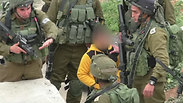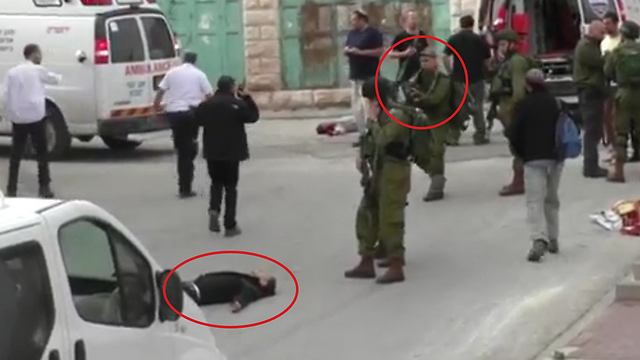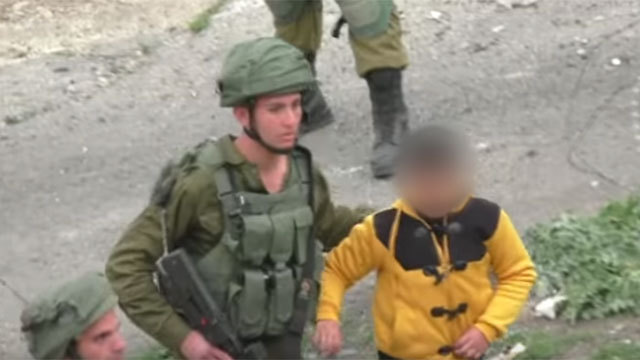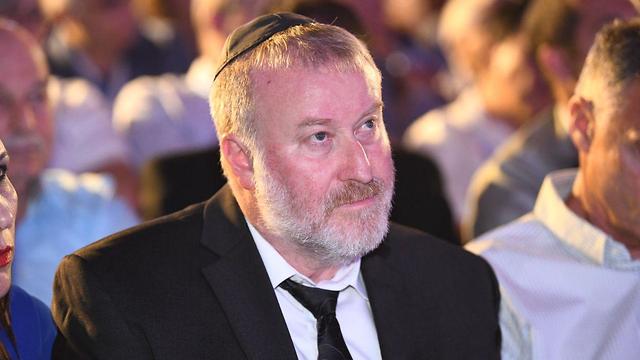
Ministerial committee approves bill seeking to bar filming of soldiers
Proposed legislation criminalizes taking photos or filming IDF soldiers on duty, setting the punishment at 5-10 years in prison; more moderate version also under consideration; deputy AG says bill won't pass legal scrutiny.
The Ministerial Committee for Legislation approved on Sunday a bill proposal seeking to bar the filming and photography of IDF soldiers, which could completely change the nature of military coverage.
Deputy Attorney General Raz Nizri said during the Ministerial Committee discussion that barring the filming and photography of IDF soldiers would not pass legal scrutiny.
"We could go for a more moderate proposal, while drawing the comparison to police officers, but the problem is that it would set a minimum for punishment," Nizri said. "This means there will be no choice but to have criminal record."
Defense Minister Avigdor Lieberman, meanwhile, welcomed the advancement of the legislation, writing on Twitter, "IDF soldiers are under attack from within by Israel haters and terror supporters who seek to humiliate, disgrace and harm them. We'll put an end to that."
Meretz leader Tamar Zandberg slammed the decision, saying "If the government wants to take care of IDF soldiers so much, perhaps it should start by handling the settlers who dismantle military vehicles, wound police officers and throw stones at soldiers."
The legislation will be brought to the Knesset for a preliminary reading on Wednesday.
The bill, sponsored by Yisrael Beytenu MK Robert Ilatov and backed by Defense Minister Avigdor Lieberman, targets anyone who documents IDF soldiers on duty and distributes the materials.
Under the original version of the bill, offenders could face anywhere between five and ten years in prison if the documentation is found to be "undermining the spirit of IDF soldiers and Israeli citizens" or harming state security.
"This decision aims to cover up crimes committed by Israeli soldiers against our people, and to free their hands to commit more crimes," Deputy Palestinian Information Minister Fayez Abu Aitta said.
The phrasing of the bill stops short of a blanket ban, aiming instead at "anti-Israeli and pro-Palestinian organizations" which spend "entire days near Israeli soldiers waiting breathlessly for actions that can be documented in a slanted and one-sided way so that soldiers can be smeared".
Naming B'Tselem and several other left-wing groups, the bill says many of them are supported by organizations and governments with "a clear anti-Israel agenda" and that the videos are used to harm Israel and national security.
The ban would cover social networks as well as traditional media.
B'Tselem shrugged off the bill.
Attorney General Avichai Mandelblit was able to soften the legislation, setting the punishment from anywhere between two weeks and three years.
But even if a more moderate version of the bill is eventually passed into law, it would still limit media coverage in the West Bank and on Israel's borders, as the Israeli media gets photos and videos of many incidents from the Palestinians or from left-wing organizations.
Diplomatic officials expressed concern that the attempt to prevent the filming and photography of soldiers in the public sphere in the West Bank could damage to Israel's image.
"We're fighting about Israel's image as a democratic country that acts with transparency, and the initiative to prevent documentation (of soldiers) could present us in the opposite light—as a country that has something to hide," one official said.
Despite Mandleblit’s softening of the punishment stipulated in the bill will be compared to a large extent to the prohibition against disturbing police officers while performing their duties, meaning that the decision to prohibit the use of cameras would be left to the discretion of the soldier, who would be authorized to limit photographers and to remove protesters causing disruptions.
The implementation of the bill would depend to large extent on instructions received by soldiers in the field.
The vague wording in the current bill will likely have to be brought before the High Court of Justice. However, the bill may not only be applicable to left-wing organizations, which for years have sought to capture violent incidents involving the IDF in the West Bank on camera and disseminated the recordings in a negative light, which supporters of the army say stains its image.

While the bill received Lieberman’s blessing, officials in the army have yet to state their position.
MK Ilatov’s office has not rejected the possibility of widening the bill to also include Israeli journalists who regularly cover what is taking place in the various sectors, and it has not yet been made clear whether it will apply to Area A, which is controlled by the Palestinian Authority.
At the same time, right-wing activists also often use their cameras to document violent skirmishes with Israeli security forces during court-ordered evacuations of illegal outposts. It remains unclear whether they, too, would be forbidden from using recording the incidents.
The majority of photographers at B’Tselem are Palestinian volunteers who permanently carry a camera. Violent outbreaks, pursuits against terrorists, raids in villages and other IDF operation on the Gaza or Lebanese border are almost invariably filmed live by the Palestinians and foreign photographers. The footage and photographs are then transferred to Arab and international television networks.
The videos are then distributed on Facebook and other social media outlets.
 |
Yoav Zitun, Shahar Hay, Itamar Eichner, Tova Tzimuki and Attila Somfalvi and Reuters contributed to this story.












